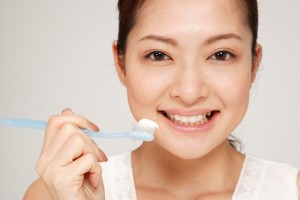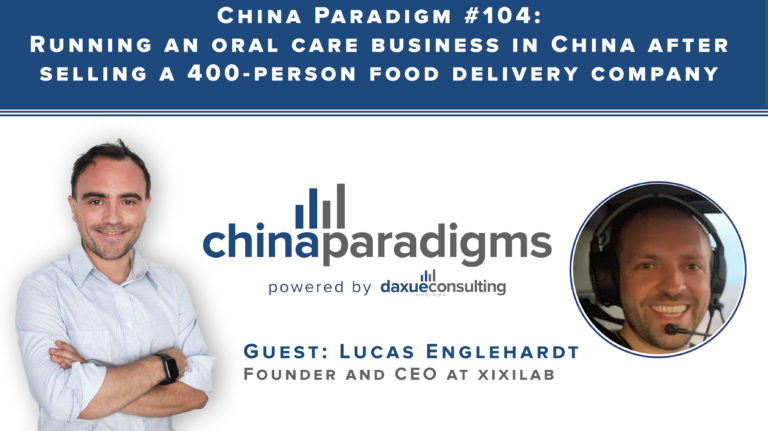To know more about China’s market, contact us: dx@daxueconsulting.com
Following the skin care and hair care, the oral care products occupy the third largest portion of the daily chemical industry. As the largest section in the oral care industry, toothpaste accounts for 77% of the total sales value. In 2012, the sales value of toothpaste industry in China reached 17.8 billion yuan and the value is expected to break through 24.5 billion yuan in 2017. In 2014, five giants in the toothpaste industry: Crest, Colgate, Darlie, Zhonghua and YNBY (Yunnan Baiyao) accounted for 68% of the market share. A fact worth remarking is that domestic brands have been steadily overtaking foreign brands these years; In 2013, the market share of domestic brands attained nearly 60%. Moreover, although supermarkets are still the primary distribution channel for oral care products, they are facing the stagnant growth of their offline sales mainly due to the rapid expansion of online retailers.
The Remarkable Rise of Domestic Toothpaste Brands
In 2012, the toothpaste industry in China was dominated by the three giants foreign brands–Crest, Darlie, and Colgate. Reported in China Shopper Report 2014, YNBY overtook Colgate in the sales rank in 2014, successfully entering the top three. Other well-known brands that are already settle in the market such as Luclean, Sensodyne, Nice, etc took their place in the top ten. In 2013, the market share of foreign brands in the toothpaste industry dropped 1.7% while that of domestic brands increased to 60%. Recently, the domestic brands have been showing a great momentum; many Chinese consumers have converted their choice from Crest, Colgate to domestic ones with stronger specific functions.
Case study: YNBY
YNBY is a well-known medicine brand in China. In 2004, it launched a range of toothpaste under the same brand name with its other medical products, taking advantage of the well-established reputation of its anti-inflammatory benefits and hemostatic effectiveness. Consumers immediately embraced the familiar products and developed a level of trust for the new toothpaste brand. YNBY had been increasing its sales considerably during last several years due to its unique products and smart marketing strategies. In 2013, its market share gained 2.6% over the previous year, reaching a total of 10.9%.
Two Trends of the Toothpaste Industry: Premiumisation and Function Segmentation
With the increasing disposable income of the Chinese consumers, their choices of toothpaste have moved from economic ones to high and middle-tiered ones, especially when high-end toothpaste such as YNBY or Sensodyne that can alleviate specific ailment of the teeth, gums or mouth cavity. The third national oral health epidemiological investigation in mainland China revealed that more than 97% of the adults are suffering from oral problems. 97% of them had dental calculus, 88% of them had tooth decay and 85% of them had gingival problems. Other problems such as tooth sensitivity, breath problem, tooth stain, etc have been affecting the people greatly. Some brands that are already successful in the Chinese market such as Luclean and Sensodyne also specialize in sensitivity resistance; YNBY specializes in its traditional remedy which gives anti-inflammatory and hemostatic effectiveness; Bamboo salt toothpaste contains activated carbon molecules that can clean teeth stains and freshen the breath. These health-oriented products have gained increasing favor among the Chinese consumers and the high pricing trend of these products even increased the sales to some extent.
Offline sales facing its greatest Challenge
 With the vast expansion of online retailers, the online sales have been climbing upwards and overtook offline sales back in 2014. The shopping events on Taobao, Jingdong, the No.1 Store, have boosted the online sales by a large degree. In terms of toothpaste, consumers in China tend to buy more online at one time and they are more likely to choose high-end products. The average sale of toothpaste in a day per person offline is 200ml while that online is 300ml. Offline sales are facing its great challenge that sales growth has been stagnant and online markets are gradually overtaking offline markets. A way out is to establish one’s online store to compete in the online market share.
With the vast expansion of online retailers, the online sales have been climbing upwards and overtook offline sales back in 2014. The shopping events on Taobao, Jingdong, the No.1 Store, have boosted the online sales by a large degree. In terms of toothpaste, consumers in China tend to buy more online at one time and they are more likely to choose high-end products. The average sale of toothpaste in a day per person offline is 200ml while that online is 300ml. Offline sales are facing its great challenge that sales growth has been stagnant and online markets are gradually overtaking offline markets. A way out is to establish one’s online store to compete in the online market share.
The staple needs of the Chinese people will ensure a consistent growing market for toothpaste, both for domestic brands and foreign brands. The increasing economic power of consumers has created a niche for high-end toothpaste with customized health benefits. To better expand their penetration and increase their sales, foreign companies are suggested to resort to three key strategies: memory structure, in-store assets and product portfolio. Lastly, the combination of online stores and offline distribution will accelerate the total sales value to the largest extent.





